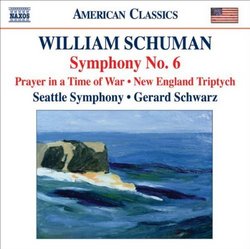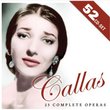The Schuman 6th -- at last in stereo
Victor A. Grauer | 06/25/2010
(4 out of 5 stars)
"In my opinion the following symphonies rank as the most outstanding works of their kind (by far) from the 20th Century: the Sibelius 4th, 5th and 6th; the Shostakovich 4th; the Webern Symphony; Stravinsky's Symphony in Three Movements; and the William Schuman 6th. There are many other great 20th Century symphonies one could name, but for me these stand out. I'm sure others would come up with completely different lists, but for anyone familiar with, and comfortable with, the most challenging music of the 20th Century, the Schuman 6th ought to rank very high indeed, as it is far and away his most ambitious, intense, imaginative and compositionally rich effort. Which is why I've been so puzzled and so frustrated for so many years at the lack of an up-to-date recording of this work. To my knowledge, the only previous recording of the Schuman 6th was the one by Eugene Ormandy and the Philadelphia, so long ago as to have been recorded in mono!
Don't get me wrong. The Ormandy recording ranks in my mind among the greatest ever made. Every time I hear it I am simply blown away by the staggering virtuosity of this performance, on the part of both the conductor and the instrumentalists. The 6th has got to be one of the most challenging symphonies ever written, not only for the listener but especially the performers, who must negotiate all sorts of obstacles, from abrupt tempo and meter changes to long passages where bucketsfull of notes must be played with great accuracy at blinding speed. And Ormandy spares his musicians nothing, taking some passages at tempi bordering on anywhere from reckless to insane! The Philadelphia comes through brilliantly. I can't hear a single wrong or tentative note in the entire peformance and I've heard it many times.
So finally, after all these years, we have a new recording by a major orchestra and conductor -- in stereo, natch. And I've been longing for many years to hear this work in the fullness that only stereo can provide. So what's my verdict? It would be unfair to expect the same degree of virtuosity and control that the original recording offers, since performances on that level are rare events indeed. The good news is that Schwarz and the Seattle undertake this challenging work with a high level of understanding and competence that conveys Schuman's message accurately and efficiently. What is lacking is the degree of reckless abandon that so many of Schuman's works seem to require -- the sense that everyone involved, composer, conductor and orchestra is walking some sort of tightrope, willing to take a terrible fall if everything doesn't come out exactly right. Since the 6th is such a huge challenge in this respect, it isn't really surprising that it took so long for a new recording to be released. Schwarz should be commended for undertaking such a daunting task.
Nevertheless, I have to confess that Ormandy and his phenomenal team have spoiled me for any performance less reckless, less virtuosic, less utterly fantastic in its perfect blend of compositional intent and realization. I will continue to play the new recording from time to time, to revel in the up-to-date stereo sound. But I'll be going back to the old one more often, as few recordings I've ever heard have such a tremendously exciting impact."
William Schuman's Sixth Symphony on Naxos
Robin Friedman | Washington, D.C. United States | 03/31/2010
(5 out of 5 stars)
"The year 2010 is the centennial of the birth of the American composer William Schuman (1910 -- 1992). In celebration of the occasion, Gerard Schwartz and the Seattle Symphony Orchestra have completed their cycle of Schuman's eight published symphonies (he declined to publish the first two) on the budget-priced Naxos label. This CD, the fourth of the series, includes Schuman's sixth symphony, while the final CD of the set includes Schuman's eighth.
Schuman had a full public life, serving as the president of the Juilliard School of Music and of the Lincoln Center; but his heart remained with composition. His music tends to be dissonant and brassy with a distinctly American and patriotic character, similar to Charles Ives. Aaron Copland made the following perceptive comment on Schuman's work.
"In Schuman's pieces you have the feeling that only an American could have written them. You hear it in his orchestration which is full of snap and brilliance. You hear it in the kind of American optimism which is at the basis of his music."
Schuman's Sixth Symphony dates from 1948 and was first performed the following year by the Dallas Symphony Orchestra conducted by Antal Dorati. Not well received at its premier, the sixth is a granitic, difficult work in a single movement that takes about 28 minutes to play. The work is full of shifts of tempo. The outer two sections, marked Largo and Larghissimo, frame four sections marked Moderato con moto, Leggieramente, Adagio, and Allegro-risoluto-Presto. The work maintains a unity for all the diversity of tempo and musical material. It is of a dense texture with a great deal of contrapuntal writing. Large-scale brass chorales and fanfares and percussion are featured, as is the case with much of Schuman. The symphony also includes extensive solo passages for violin, flute, oboe, and bassoon. The sixth has received mixed critical reviews, but I found it well worth hearing.
The remaining two works on this CD are more popular in character, and show the composer writing ceremonial, patriotic music. The "Prayer in a Time of War" dates from 1943. It is a composition of about fifteen minutes which meditates upon United States' participation in WW II. The two outer portions of the work are slow, reflective, somber, and prayerful. They frame a middle section which is lively with brass fanfares and with American themes of hope and optimism. The meditative, quiet portions of the work feature solo passages for the orchestra's inner voices, including the viola, cello, and horns. The work ends with a solemn battlefield commemoration featuring extended drum rolls. Schuman's commemoration of wartime suffering and sacrifice remains timely and moving.
The CD concludes on a lighter tone with Schuman's most famous composition. The New England Triptych dates from 1956 and adopts musical material from the American composer of the Revolutionary era, the self-taught and eccentric William Billings (1746 - 1800). The work opens with Schuman's brassy, percussive development of Billings' hymn "Be glad then America" which celebrates the United States' attainment of independence. The second movement is a beautiful slow setting of Billing's hymn "When Jesus Wept" which uses a reduced orchestra and places heavy emphasis on themes in the oboe. It also makes uses of a relatively unfamiliar percussion instrument, the tenor drum. The finale sets Billings' most famous work "Chester" to bring the piece to a patriotically brilliant conclusion:"Let tyrants shake their iron rod,/And Slav'ry clank her galling chains,/We fear them not, we trust in God,/New England's God forever reigns."
This CD features detailed descriptive liner notes by Joseph Polisi, the president of Juilliard and the author of a biography of William Schuman American Muse: The Life and Times of William Schuman (Amadeus) . The recording of the sixth symphony dates from 2008. The Prayer in Time of War was recorded in 2005 and the New England Triptych still earlier in 1990. The CD and its companions are deserved tributes to William Schuman and to American achievement in art music.
Robin Friedman"


![Mozart: Le nozze di Figaro / Barenboim [highlights]](https://nationalbookswap.com/cd//m/85/9185/6029185.jpg)
